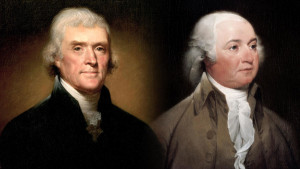Two Presidents Died on the Same July 4: Coincidence or Something More?
On July 4, 1826, America celebrated 50 years of independence as, just a few hours apart, two of its Presidents took their final breaths. At the time of his death, Thomas Jefferson was 83, while John Adams had turned 90 the year before. Though both were unwell, their deaths came as a surprise to many—particularly as they coincided with one another on this very striking date.
In the weeks that followed, Americans offered a variety of explanations for the sudden loss of these two presidents. Though some likely wrote it off as coincidence, many saw evidence of divine design at work. In a eulogy delivered the following month, for instance, Daniel Webster wondered what this “striking and extraordinary” coincidence might suggest. The men’s lives had been gifts from Providence to the United States, he said. So too were their length and “happy termination,” which he saw as “proofs that our country and its benefactors are objects of His care.”
But if it wasn’t a coincidence or divine intervention, what other explanations might there be? Modern scholars have sometimes attempted to pinpoint why such a statistically unlikely event might have taken place. After all, Jefferson and Adams didn’t only die on the same day, with an already low probability of 1 in 365. They died on the same significant date and historic anniversary. “When appeals to coincidence are insufficient,” writes Margaret P. Battin in a 2005 Bulletin of the Historic Society report, “we must look for explanations in common circumstance or common cause, or for causation from one case to the other.”
One possible explanation proposes that Jefferson and Adams deliberately “held on” for the anniversary. The phenomenon of people keeping themselves alive until they’ve said goodbye to a loved one or experienced a significant anniversary is well-documented: It’s entirely possible that Adams and Jefferson’s “will to live” kept them going through those final days ahead of July 4th—but wasn’t enough to keep them alive after that.
In fact, even contemporary observers thought this might have been a conscious decision. In a eulogy for Jefferson delivered in New York in mid-July, the businessman and politician Churchill C. Cambreleng observed: “The body had wasted away—but the energies of a powerful mind, struggling with expiring nature, kept the vital spark alive till the meridian sun shone on our 50th Anniversary—then content to die—the illustrious Jefferson gave to the world his last declaration.”
Jefferson is also said to have refused his usual laudanum on the night before he died, which might have affected his ability to cope with the pain. In a separate eulogy, in fact, John Tyler described Jefferson’s often-expressed desire to die on the Fourth of July, adding even more credence to the theory that their deaths on that providential date may not have been entirely accidental.
Conspiracy theories about their concurrent deaths have also circulated, both at the time and in the centuries since. Battin suggests a possible “silent conspiracy among physicians, family members and other caregivers to help their patient ‘make it’ to the 4th,” where the effort came to an end once the day had been reached. Adams’ granddaughter, she observed, reported their doctor giving her grandfather an experimental medicine which he said would either prolong his life by as much as two weeks, or bring it to a close before 24 hours were up. Even those quite unconnected to the deaths wondered if something more sinister, or planned, had been afoot.
In a letter, John Randolph, of Roanoke decried Adams’ death as “Euthenasia, indeed.” What’s more, he added, “They have killed Mr. Jefferson, too, on the same day, but I don’t believe it.”
But all of these explanations have limitations of one sort or another, particularly as the historical evidence is so scarce. Whatever the reason behind it, these deaths, and their date, were a remarkable concurrence—and one made even more striking five years later, with the death of James Monroe on that same auspicious date. A few days after Monroe passed away, the Boston Traveler was not the only newspaper to observe, “Again our national anniversary has been marked by one of those events, which it may be scarcely permitted to ascribe the chance.”
SOURCE: HISTORY
SOURCE: Natasha Frost







